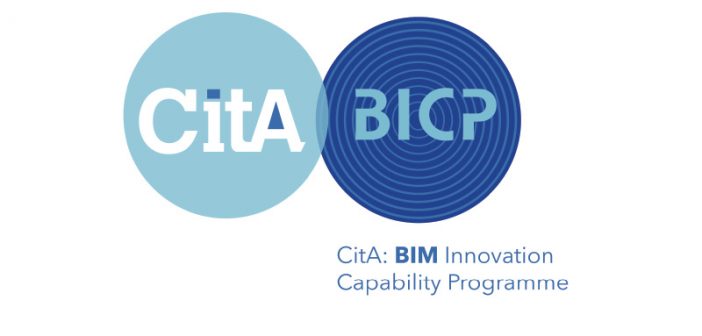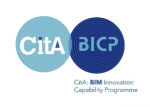The Construction IT Alliance (CitA) recently published its Global BIM Study as part of its BIM Innovation Capability Programme (BICP).
The study sought to identify how BIM was being currently addressed in 27 countries across the globe. The study sought to identify the presence of three key ingredients in these countries:
- Regulatory requirement for BIM
- Champions driving BIM
- Noteworthy publications
The report identified a number of recurring themes that would help to shape Ireland’s BIM programme.
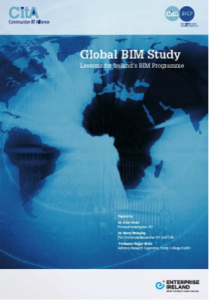
The strategy included reviewing and adapting contracts and procurement to create the environment for BIM to work; selecting appropriate pathfinder projects from which to deploy and test the use of BIM during the implementation programme; development of BIM guidelines; training and education; adoption of international BIM standards and critically important the allocation of an appropriate funding model to sustain the delivery of the programme.
The second major report from the BICP team is the imminent Irish BIM Study 2017, which seeks to document the Republic of Ireland’s engagement with BIM over recent years and its current state of readiness to respond to working with BIM in a formal regulated environment for public sector projects.
BIM in Ireland
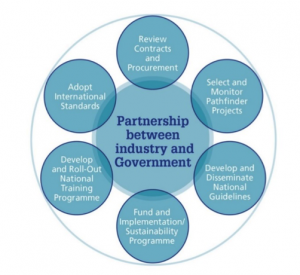
Figure 1; Recurring Themes in International BIM Programmes (Hore, West and McAuley, 2017 pp. 48)
The BIM in Ireland report will document but also celebrate the achievements of the Irish construction industry to embrace BIM despite the absence of any formal position in respect to BIM by the Irish Government.
Back in 2011, the Royal Institute of Architects Ireland (RIAI) conducted a survey, which found that BIM adoption among their members was relatively low. Whilst not directly comparable the figures reported in the most recent CitA and Enterprise Ireland Digital Transition survey reported a very high level of confidence in BIM skills and knowledge (See Figure 2). Whilst confidence is relatively high the extent of BIM adoption remains low despite the extent of debate and publicity that BIM is receiveing both at home and overseas.
The important work of Enterprise Ireland in recognising the value proposition of BIM for both its client bodies but also the wider construction supply chain in Ireland should be acknowledged. The funding of the BICP and the formation of the National BIM Council (NBC) by Enterprise Ireland are significant interventions that will assist in the formation of an eventual BIM policy for public sector projects in Ireland in the future.
The second national survey to benchmark the level of Building Information Modelling (BIM) adoption in Ireland revealed that 76% (67% 2015) of respondents possessed confidence in their organisation’s BIM skills and knowledge. 79% of the sample also reported an increase in demand for BIM in Ireland.
Extract from National BIM Survey 2016 (CitA and Enterprise Ireland, 2016)
The Irish BIM study builds on the findings from the BICP Global BIM Study providing a more in-depth study in regards to context and challenges; drivers for BIM; BIM champions; BIM regional and professional body networks; case studies; education and training programmes; BIM research in Ireland; event activities; results of consultations with industry and Government and what the future is likely to hold in an increasingly digitised world.
The Irish Government position in respect to BIM has graduated to a consistent message for the construction sector that BIM is good, if not essential, to future proof business if our sector is to remain competitive.
In 2013 the Forfás report stated that if Irish Construction firms were to remain competitive then they must move towards the use of BIM based integrated project management. The Construction 2020 report suggested that BIM was a powerful tool in driving efficiencies and increased productivity in construction and was rapidly becoming a standard requirement internationally. More recently, the CIF Construction 2027 report called for strong recommendations that industry organisations promote the use of BIM, so that they can successfully compete in international markets.
The most recent reference to BIM was in the Action Plan for Jobs 2017 report where there was a specific focus on embracing new opportunities arising from the digitalisation of the economy. The successful transition to a digital economy was seen as essential for boosting sustainable growth in the economy.
Whilst Recommendation 162 is explicit and relevant it must be seen to address the challenge of tackling an inadequate supply of housing. It is important that any BIM policy must be seen to support the ambitious targets set out in the Action Plan for Housing and Homelessness, in July 2016, which aims to double the annual level of residential construction to 25,000 homes and deliver 47,000 units of social housing in the period to 2021. The immediate challenge for the National BIM Council is how can a BIM Roadmap for Ireland help to support these targets.
The significance of this recommendation must also be seen as complementary in the context of the Construction 2020 report mentioned earlier but also other Irish Government publications in recent years, namely:
- Enterprise 2025 – sets out a ten-year jobs and enterprise strategy.
- Innovation 2020 – sets out a five-year strategy for research and development, science and technology, including a roadmap to deliver on the vision for Ireland to become a global innovation leader by focusing on excellence, talent and impact.
- National Skills Strategy 2025 – sets out a vision for the period up to 2025 of how Ireland can develop relevant skills and ensure that our supply of skills is activated and effectively used.
- National Planning Framework – sets out a vision of what Ireland will look like in 20 years time
Construction IT Alliance and BICP
CitA continues to play a prominent role in the promotion of BIM in Ireland with its popular CitA Smarter Cooperative Building Series, the successful CitA Skillnet training programme and the BIM Innovation Capability Programme (BICP). CitAs role as secretariat to the National BIM Council also ensures that CitA remains connected to the conversation in respect to BIM and the significance it may play in government policy in the future.
The Irish BIM study will also highlight the important work being carried out by various BIM communities in Ireland, which include CitA BIM Group, CitA BIM Regional Group, Revit Users Group, the Construction Industry Council BIM Group and the various BIM Groups set up by representative organisations in Ireland, for example the RIAI, SCIS, CIF, Engineers Ireland and the ACEI among others.
The BICP commenced in early 2016 and is in effect a preparatory programme for BIM in Ireland. This research project seeks to collate applicable BIM data leading from both a comprehensive desktop and field study and to disseminate this data in a structured way to both the Irish construction industry and the National BIM Council, in order to inform an Irish BIM Roadmap for Ireland. The research team includes Dr. Alan Hore (Dublin Institute of Technology), Dr. Barry McAuley (CitA) and Professor Roger West (Trinity College Dublin).
An outline of the Work Packages are shown in Figure 4.
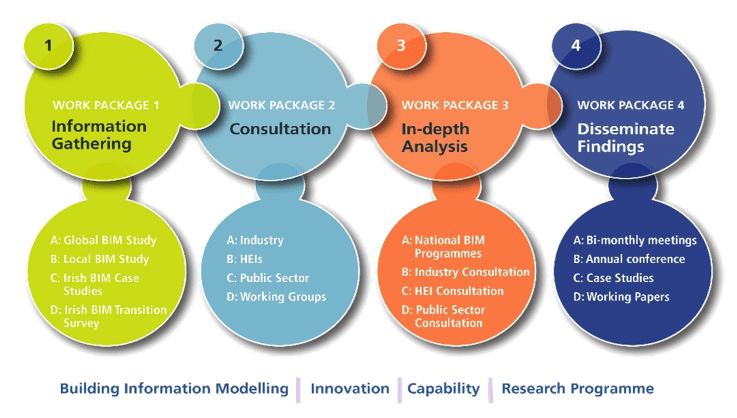
Figure 4: Overview of BICP Work Packages
In order to benchmark Ireland’s BIM capability, the BICP team, in partnership with Enterprise Ireland, released the results of the second national BIM survey. A sample of 100 of the most influential leaders in Architecture, Engineering and Contracting were selected with the co-operation of the ACEI, CIF, SCSI, BMF, Engineers Ireland and the RIAI. This second survey reported figures as high as 76% of respondents who possessed confidence in their organisation’s BIM skills and knowledge, which is an increase of 7% from 2015. The 2016 results also provided a slight increase in organisations reporting an increased demand for BIM. A total of 80% of respondents reported an increase in demand for BIM in Ireland. The feedback received by the groupings appeared to demonstrate a growing maturity of BIM within the representative professional groups in Ireland.
The BICP team have been actively involved in consultations with public, private and HEI bodies in Ireland.
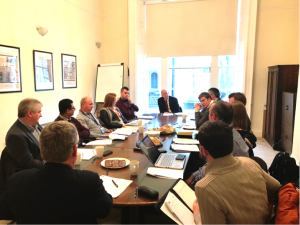
Figure 5: BICP Industry Consultation Workshop, November 2016
Examples of public sector bodies consulted include the Office of Public Works, Irish Water, Transport Infrastructure Ireland, the Department of Education and Skills and Dublin City Council.
With regard to private sector consultation, the BICP team have had ongoing engagement with industry practitioners. In an effort to advance this engagement, a BICP Consultation Workshop took place in November 2016 with representatives from 12 different organisations. This included a diverse representation from professionals within the Architectural, Engineering, Contracting, Legal, Surveying, Consulting, Training and Client sector. Items under discussion included establishing strategies to increase the value proposition of BIM to clients, establishing current legal impediments, identification of pathfinder projects, BIM standards and BIM education.
The BICP team have also engaged with those who have a particular responsibility for BIM in Ireland. An extensive database of persons who have a particular responsibility for BIM in their organisations has been created, which extends to in excess of 100 individuals. A structured engagement programme is taking place with this group to elicit data in respect to:
- Projects they have / are currently deploying BIM tools and processes on
- Grant funding for deploying BIM
- BIM certification status
- BIM protocols or standards they are currently deploying
- Advice they would give to the Irish NBC with regards to its proposed roadmap
Ongoing consultation is also taking place with HEIs, in particular those HEIs that have developed BIM programmes or particular learning modules in recent years. The BICP are carrying out a systematic review of third level BIM education and BIM training programmes currently on offer in Ireland, which includes looking at the entry and destination statistics of the graduates.
The BICP have found that despite the absence of regulation for BIM there is still a high level of uptake in BIM training and education in Ireland All HEIs are actively aware of the growing requirement for BIM and, in that respect, they have tailored existing or created new programmes to respond to this necessary graduate skillset. To-date consultations have taken place with the Dublin Institute of Technology, Trinity College Dublin, Waterford Institute of Technology, Galway Mayo Institute of Technology, etc.
A search facility for these programme has been included on the BICP website.
Additional data collected includes details on Irish BIM case studies. Examples of case studies that are currently included on the BICP website include the National Children’s Hospital, BAM Ireland School Bundle 4 PPP and the DIT Grangegorman Campus.
A number of case studies that were presented at the CitA BIM Innovation Awards 2016 will also be included in the case study archive on the BICP website. Ongoing engagement with BIM personnel has also led to the identification of additional case studies that the BICP team would hope to document as part of the data collection Work Package throughout the remainder of 2017.
The report will also include an update on the work of the BICP Working Groups, in particular the Client BIM Group and the BIM Academic Forum Ireland Groups (BAFI).
The BICP team are regularly in contact with international BIM programme groups. A recent example of this was the visit by the BICP team to meet the Scottish BIM Implementation team in Edinburgh. This programme is the most proximate international programme which sees a Level 2 BIM requirement being formally introduced as government policy in Scotland in April this year. The BICP Team were very impressed with the progress made by a relatively small but dedicated team headed up by Paul Dodd and David Philp at the Scottish Futures Trust (SFT). The BICP Team were delighted to be afforded the opportunity to sit in a SFT BIM Public Sector Buyers Group meeting to experience first-hand the readiness of the Scottish Public Sector stakeholders to engage with this formal requirement for BIM on Public Sector projects in Scotland from April this year. The BICP Team intend to continue this dialogue with international BIM programme teams and to carry out an in-depth analysis of particular international BIM programmes, which will be documented later this year in the second BICP Global BIM Study.
The BICP Irish BIM Study will be available to download from the BICP website in late Mayl.

